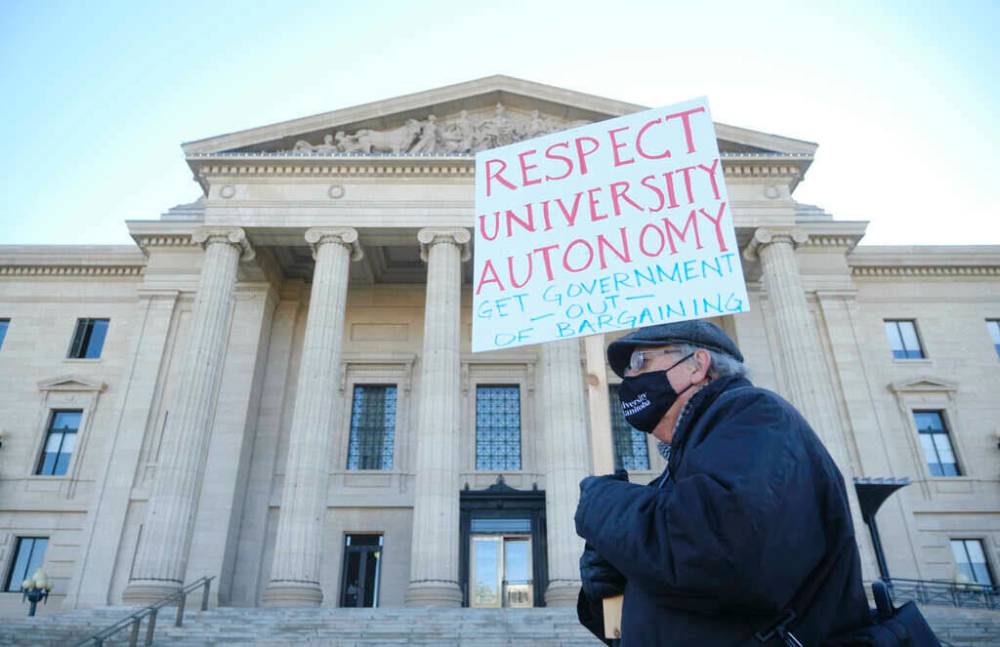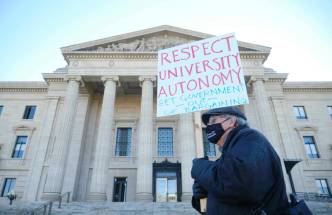Students must be at forefront in strike talks
Read this article for free:
or
Already have an account? Log in here »
To continue reading, please subscribe:
Monthly Digital Subscription
$0 for the first 4 weeks*
- Enjoy unlimited reading on winnipegfreepress.com
- Read the E-Edition, our digital replica newspaper
- Access News Break, our award-winning app
- Play interactive puzzles
*No charge for 4 weeks then price increases to the regular rate of $19.00 plus GST every four weeks. Offer available to new and qualified returning subscribers only. Cancel any time.
Monthly Digital Subscription
$4.75/week*
- Enjoy unlimited reading on winnipegfreepress.com
- Read the E-Edition, our digital replica newspaper
- Access News Break, our award-winning app
- Play interactive puzzles
*Billed as $19 plus GST every four weeks. Cancel any time.
To continue reading, please subscribe:
Add Free Press access to your Brandon Sun subscription for only an additional
$1 for the first 4 weeks*
*Your next subscription payment will increase by $1.00 and you will be charged $16.99 plus GST for four weeks. After four weeks, your payment will increase to $23.99 plus GST every four weeks.
Read unlimited articles for free today:
or
Already have an account? Log in here »
Hey there, time traveller!
This article was published 16/11/2021 (1484 days ago), so information in it may no longer be current.
New Manitoba premier Heather Stefanson and senior ministers have gone to considerable lengths to distance themselves from many unpopular aspects of the legacy of former premier Brian Pallister. The strike by University of Manitoba faculty is an opportunity to show how the new PC team is different from the old.
About 1,200 professors and librarians went on strike Nov. 2 after contract talks broke down over salary increases. There is a discouraging sense of déjà vu to seeing professors on the picket line instead of lecturing to a class — the last U of M faculty strike, in 2016, lasted for 21 days.
Ms. Stefanson and Advanced Education Minister Wayne Ewasko might say they want to stay out of the matter and let collective bargaining proceed without direct government interference but, like it or not, the past actions of their government are at the crux of the job action.

Faculty say they are striking because Mr. Pallister’s government imposed restrictive measures that froze wages in 2016, giving U of M professors some of the lowest salaries of Canadian research universities. They say this rock-bottom pay scale makes it hard to attract and keep good staff, with the inevitable result that students will look to other provinces for a highly regarded education.
Faculty also say the province is playing a behind-the-scenes role in the ongoing negotiations, imposing a mandate to restrict wage increases to a certain level. For its part, the province says mandates are not unusual and, as a main funder of the university’s budget, it must be a responsible steward of the public purse.
Meanwhile, sitting on the sidelines — or, more accurately, sitting at home waiting for the resumption of studies for which they have paid tuition — are U of M students.
Many adults regard their years of post-secondary education as life highlights, a stimulating time of discerning one’s gifts, preparing for careers and expanding networks of friends. Studying at university is commonly looked back upon as hard work, but as a stage of life that is exciting and often fun.
For current U of M students, however, their university studies have been grim. The COVID-19 pandemic that hit Manitoba in 2020 robbed them of rich in-person university experiences. They missed stimulating face-to-face discussions with professors, the chance to participate in extracurricular university activities and memorable social opportunities — such as, perhaps, sitting near a fellow student who is sending out signals of possible romantic interest.
COVID-19 consigned these students to the second-rate substitute of virtual learning, but many had recently returned to campus for the in-person university experience, albeit with pandemic precautions. Then, two weeks ago, both in-person learning and online lectures were cancelled for most students as faculty went on strike.
The U of M students don’t have an official seat at the bargaining table, where negotiators continue to meet this week to work toward an agreement, but the students should be foremost on the minds of the U of M bargaining team, the faculty association and the government.
The province should use its representatives on the university board of governors to signal a new flexibility aimed at reaching a deal that lets the university resume its important role of educating the next generation of Manitobans. Such signalling should be tried before resorting to heavy hammers such as arbitration or back-to-work legislation.
The long-term goal for Manitoba should be to ensure a higher-education system of competitive quality, which means paying faculty fairly. The short-term goal should be to let students resume classes as soon as possible, before the semester is lost.















